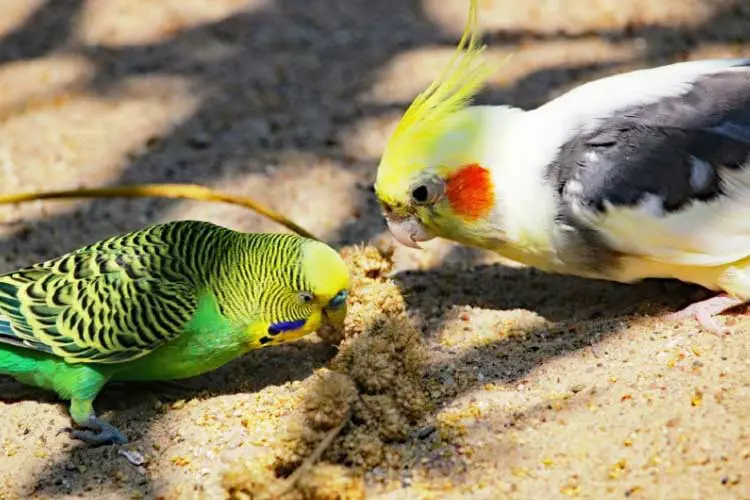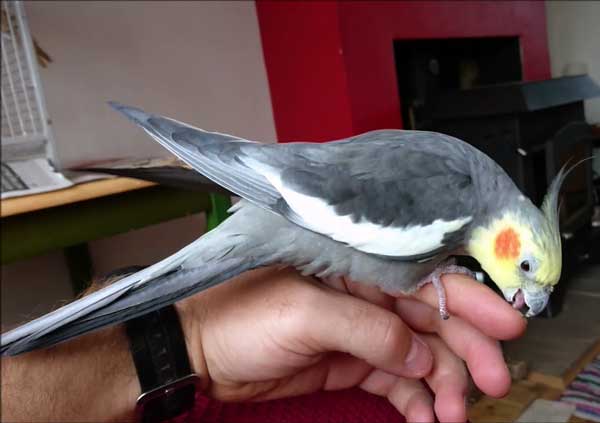Any bird keeper who has a budgie or cockatiel has to deal with their poop regularly. So, it’s normal to have doubts about how safe it is to deal with. Here, in this article, we are going to eliminate the uncertainty about this matter.
Is budgie and cockatiel poop dangerous? Are these poisonous? Their poop is not inherently dangerous and poisonous. But upon drying it grows bacteria and fungus that can cause numerous serious diseases like psittacosis, histoplasmosis, avian influenza, salmonellosis, meningitis, toxoplasmosis, etc.
However, there is a lot more you need to know about dealing with your birds’ poop. Through this article, we will demonstrate the safe cleaning process and how to efficiently use their excrement. Furthermore, how to reduce the health hazards associated with their poop. So, if you’re curious, continue reading!
Is Budgie And Cockatiel Poop Dangerous? Or Poisonous?
As we already mentioned, the poop of these birds can be a major health issue once they dry up. Dried droppings of budgies and cockatiels contain several microbes. Those microbes can easily make any other animal or human ill. Sometimes, the wet poop of sick or infected birds is also a potential hazard for humans.
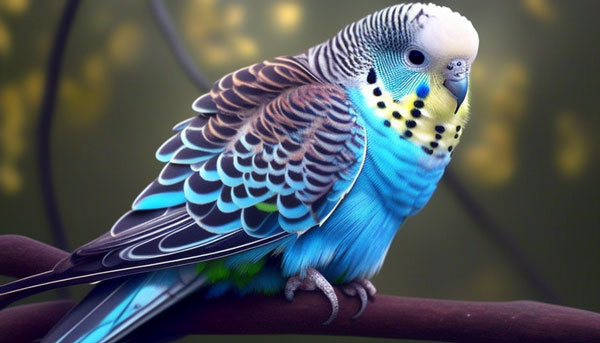
Large amounts of dried poop stick to the bottom and become airborne particles when disrupted. When breathed in, those particles carry microbe spores inside the respiratory tract. Those spores can multiply and spread to the lungs and even to the membrane of the brain or spinal cord. As a result, critical health issues are created.
Moreover, a large accumulation of poop releases ammonia in huge amounts. This is capable of causing respiratory diseases, and lungs and sinus infections.
The Diseases Caused By Budgie and Cockatiel Poop And Their Symptoms
If you get affected by microbes from your birds’ poop, then you should start the treatment immediately. A proper understanding of symptoms and treatment methods is very crucial.
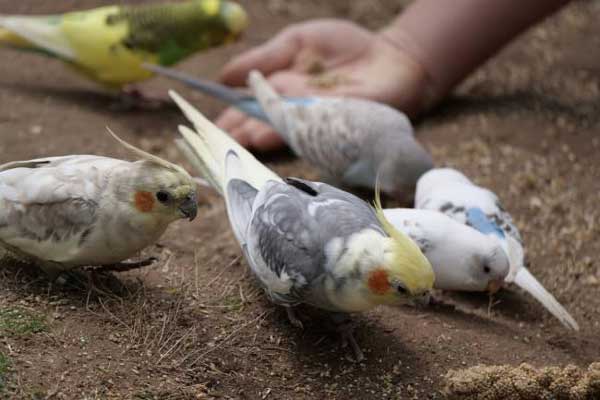
Most of these disorders can be treated at home in most circumstances. However, if not addressed promptly, it might lead to serious health concerns. That is why you should see a doctor for adequate medical treatment. But how will you know whether or if you are affected?
| Microbes | Name of the diseases | Symptoms |
| Chlamydia psittaci | Psittacosis | Headache Fever Chills Dry cough Muscle pain Chest pain In rare cases, pneumonia and myocarditis |
| Salmonella spp. | Salmonellosis | Fever Diarrhea Muscle cramps Abdominal cramps Nausea |
| Histoplasma capsulatum | Histoplasmosis | Fever Cough Extreme tiredness Lung infection |
| Cryptococcus neoformans | Meningitis | Fever Headache Stiff neck Nausea Sensitivity to light Confusion |
| Giardia | Giardiasis | Diarrhea Stomach cramps Weight loss Fatigue Gas bloating |
| Toxoplasma gondii | Toxoplasmosis | Headache Muscle aches and pain Swollen lymph glands Fever Inflammation of eye |
Most of these diseases caused by birds’ poop are respiratory diseases. People with poor immune systems are more susceptible to these infections.
Sensing Budgies’ and cockatiels’ Wellness From Their Poop
Sometimes bird poop is called the mirror of their health. You can detect if a bird is suffering from disease or parasitic infection by examining the poop’s color and consistency.
The poop of a normal budgie and cockatiel contains three elements:
- Stool
- Urine
- Urate
A whitish urate, clear urine, and dark green stool are normal. If your birds are sick, then the color of the stool will be yellowish, dark brownish, mushy, and will have a pungent or bad odor.
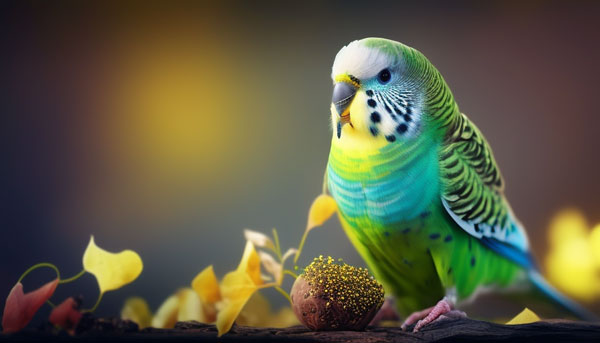
If the feces of your birds are not normal, there is a high chance that your birds are suffering from digestive tract infections. Which will create a threat for you eventually. So, consult a vet for your birds’ treatment.
How Often Do Budgies and Cockatiels Defecate?
Poop consistency and regularity are the major indicators of bird health. Less or more than the normal amount is a sign of sickness in your budgie and cockatiel.
A healthy budgie takes a dump almost 40-50 times a day. Precisely, they poop once every 20 minutes. On the other hand, a cockatiel defecates almost 18-26 times a day. Interestingly, they even poop while sleeping.
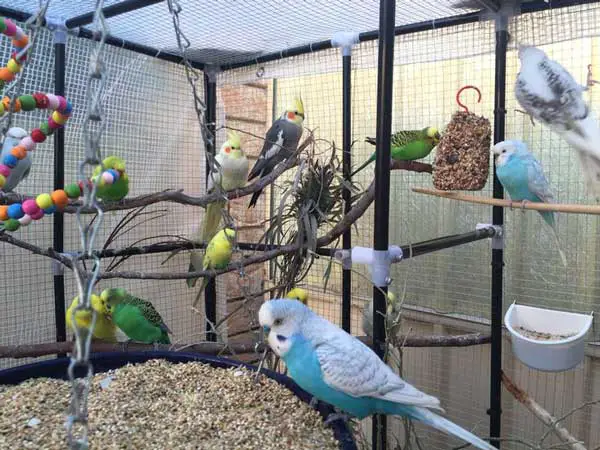
There might be some deviations in these amounts sometimes. But if this irregularity continues for more than a couple of days, you should visit a vet.
How to Prevent the Hazards From Budgie and Cockatiel Poop?
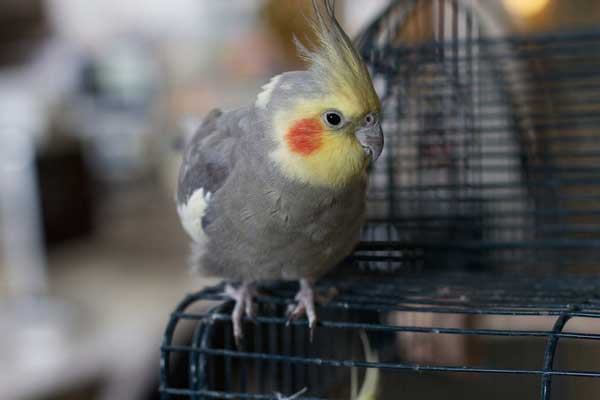
Though bird droppings are hazardous, potential risks can be avoided by following a few rules. Which are:
- You should avoid touching the droppings area directly. You better wear a pair of disposable gloves.
- Wild birds can carry more diseases and there are more microorganisms present in their feces than any pet birds. That’s why try to keep them away from your residence by using bird-proof gel or bird spikes.
- Birds are more likely fond of pooping again in the same place where they left their mark before. So, proper cleanup of droppings is essential to prevent their further defecation.
- Pet budgies and cockatiels normally are safe when they are healthy and their cages are clean. Therefore, make sure you are cleaning their cage regularly.
Safe Cleaning of Budgie and Cockatiel Feces
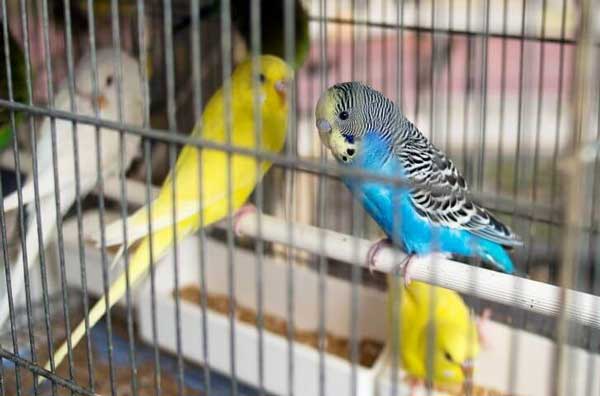
To avoid the damage of color and risks of health diseases, it’s a great choice to clean bird poop regularly. Here are a few steps that you need to follow while cleaning those poop:
- Try to wear protective attire when you are removing bird droppings.
- Plastic gloves and eyewear are recommended when removing large amounts of feces.
- Wet droppings can be cleaned easily by using a wipe.
- Use a cleaner labeled for bird droppings or vinegar/ water solution. Because using household cleaners will harm your bird.
- If the poop is dried on the surface, first spray some water on it and wait for 10 minutes. Then, scrape it using a spackle knife. After that, spray water again on the remaining poop and wipe it off.
- If the poop is several days old, it has to be wet with water. Then, leave it until it moistens enough. After that, scrape it for cleaning.
- In the case of clothing, don’t try to remove it until it gets dried. Otherwise, it will smear deeper into the fabric. Besides, it will be harder to remove the spots created by poop. Once the poop is dry, scrape it off easily. Then wash your clothes.
- Wash hands properly after cleaning birds’ poop.
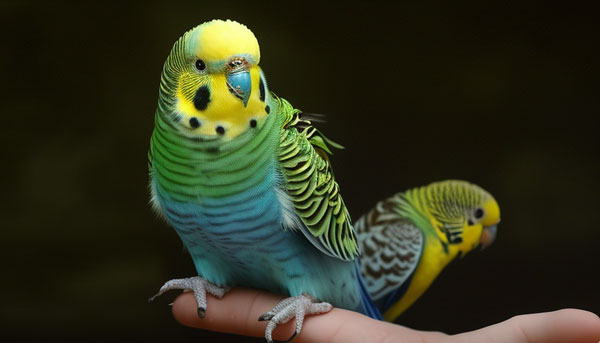
Utilization of Cockatiel and Budgie Poop
The white portion of their poop contains uric acid. Which contains a lot of nitrogen and phosphorus. That’s why there is a great scope to use their poop as fertilizer.
Phosphorus and nitrogen in droppings are great additives for compost or fertilizer. Adding these nutrients to an already existing ecosystem will provide a cascading effect. This will make a great fertilizer for the garden.
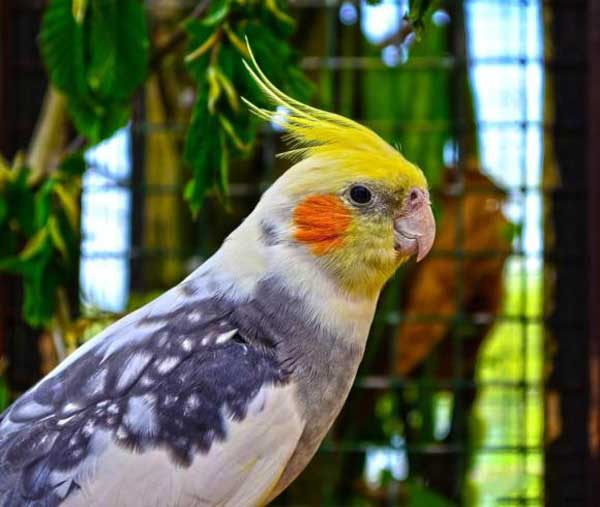
You should make sure that the drop is covered with compost completely. This will prevent the risk of airborne contamination.
FAQs
We understand it’s a lot to take in. In this section, we will discuss some of the most frequent questions people have on this matter.
Yes. It is safe. Potty training makes your pet birds a better house pet. But, training shouldn’t be to the extent that they control their poop incurring kidney damage while waiting for your verbal command. That will be fatal for your pet birds.
A dirty cage leads to the risk of a pet’s infection. Therefore, you should spray down, scrub and wash all poop from cages at least once a week. To be noted, you should use non-toxic disinfectant and hot water.
Their poop contains uric acid. This uric acid is capable of leaving a mark on the fabric. Besides, it can also deface and damage the paint of vehicles or any surfaces if it is left uncleaned.
Outro
So, is budgie and cockatiel poop dangerous? Are these poisonous? Although they are inherently not poisonous, they can be dangerous and poisonous when dried up and left for too long. So, it’s always recommended to clean their droppings regularly without directly touching them.
So in the case of your pet budgies or cockatiels, take proper care in cleaning their waste for preventing health hazards that might even affect you or other pets in the house. In this article, we talked about the methods of handling bird droppings. Besides, you can also use your birds’ waste as fertilizer for the plants in your garden.
